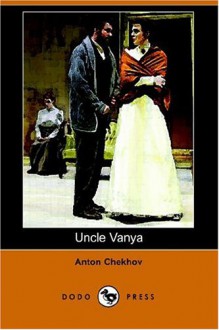
This is the last of the four Chekov plays that was in the book that I picked up in a second hand bookshop in Adelaide. The main reason that I grabbed the book was because I had never read anything by Chekov before, and also it was one of those nice hardcover editions (though I suspect that it is actually a part of a much larger collection of world literature, like the ones that are advertised in television in one of those ridiculously long infomercials, and they always cry out 'wait there's more' and then sign you up for something you are likely to regret in the future – at least this is literature, and the book looks nice, so <i>I</i> wouldn't necessarily regret it – though I do prefer my books to be eclectic in character rather than a part of an identical set).
As I have mentioned in the other Chekov plays I have commented on, this is basically a modernist play which once again sticks with a similar theme: the changing nature of Russia at the end of the 19th century. Modernism, as I can see, is a movement away from the stories of the past where you dealt with kings and princes, and towards the ordinary in life. In this place Chekov actually explores how the nobility are being thrust into the ordinary of life, and the struggles that they face in the process.
The issue that is raised here is that in the past society was very much separated by class, and the nature of class meant that there was no real vertical movement. However the modern world was bringing about a lot of changes in that regards, in that the ordinary people were becoming wealthier, and the nobility were becoming poorer. In Russia, a pretty backwards country by the standards of the rest of Europe, there was still a lot of resistance to this change, but the change was coming about nonetheless.
Modernism, thus, is a movement away from the epic poetry of the past, and from the romantic poetry and prose of the early nineteenth century. The high ideas of love and destiny were no longer the mainstay of society, as a rising intellectual class began to have access to literature that the ordinary people of the past did not. This period also saw the beginnings of the pulp novels, which picked up on the idea of the adventurous kings and princes, though in many cases the pulp novels also dealt with ordinary people, but gave them the opportunity to be able to rise above their class.
The other thing about this play that I have noticed is that there are a number of discussions regarding environmentalism. It seems that the idea of the environment was a concern back then, though I suspect it had a lot more to do with the idea of the beauty of nature rather than today where we are dealing with concepts ranging from poisoning the Earth to changes in the climate. There are discussions about clear cutting forests, but it seems that the characters in this play are more concerned with the natural beauty of the forest rather than any scientific concepts such as erosion. We see similar things in Charles Dickens, where he describes the mid-north of England being an industrial wasteland, though I suspect that this has changed a lot since his days.

 Log in with Facebook
Log in with Facebook 





